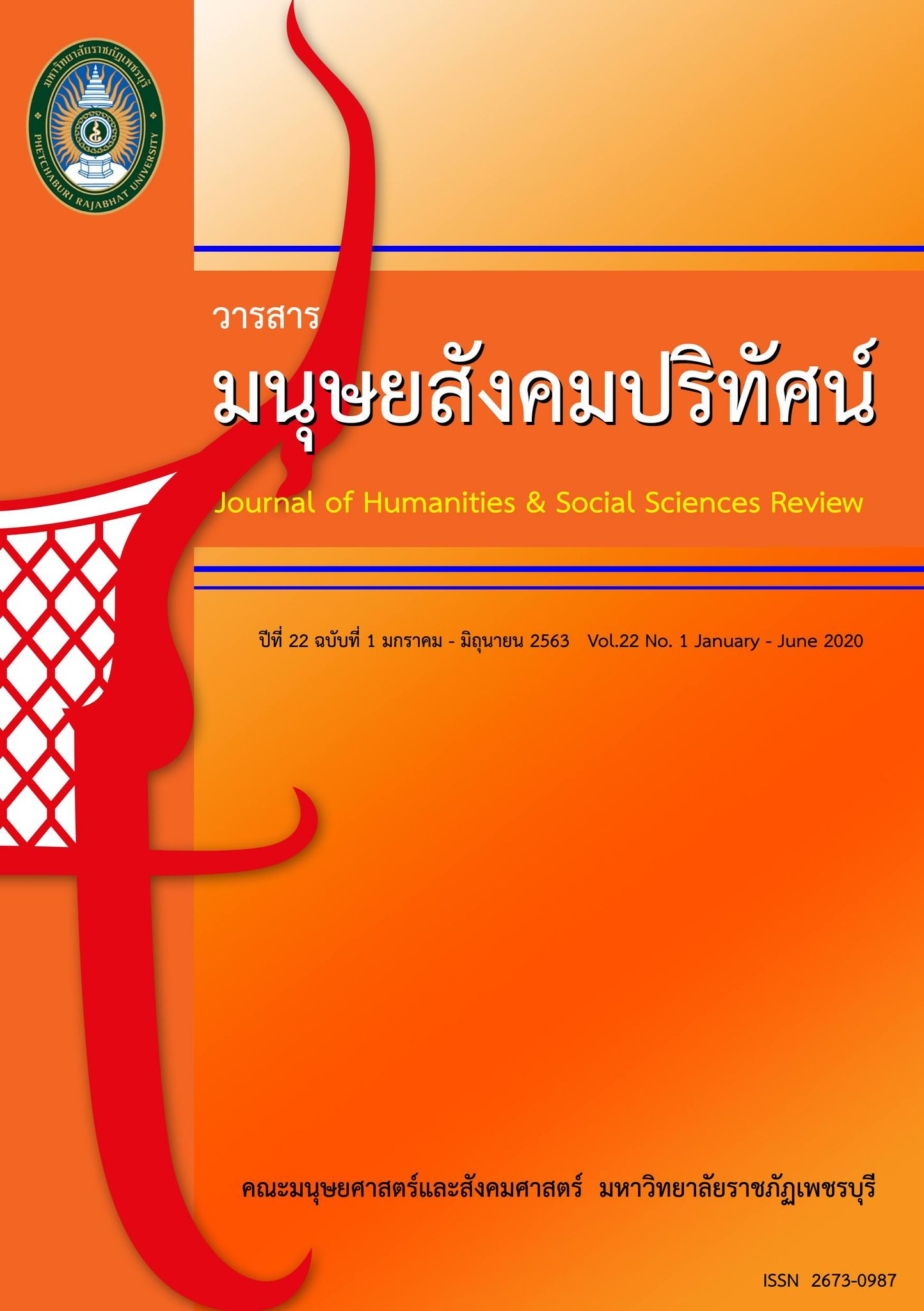แนวทางการพัฒนาทักษะการเรียนรู้ในศตวรรษที่ 21 ของครูโรงเรียนเครือข่ายฝึกประสบการณ์วิชาชีพครู สังกัดสำนักงานเขตพื้นที่การศึกษาประถมศึกษาฉะเชิงเทรา เขต 1
Main Article Content
Abstract
The purposes of this research were 1) to study level of learning skills in the 21st century of teachers, 2) to study problems and solutions regarding learning skills in the 21st century of teachers, and 3) guidelines to develop learning skills in the 21st century of teachers. The samples were 263 teachers of professional teacher training network schools and 5 people who had experience in developing learning skills. Questionnaires and interview forms for group discussion were used as the tools of the research. The statistics for data analysis were frequency, percentage, and content analysis. The research results were as follows: 1) The learning skills in the 21st century of teachers as a whole and in each aspect were at a high ranking. 2) The problems with learning skills in the 21st century of teachers were creative skills in organizing new learning activities; skills in using information technology; planning and designing innovations that were suitable for learning management at present; adequacy and modernization of technological media equipment for learning management and lots of other workloads. The solutions were training the use of innovation and technology, organizing a learning exchange platform for teachers to present creative innovation, conducting seminar forum of professional learning community (PLC), providing sufficient and modern computers, and also prioritizing works clearly and appropriately. 3) Guidelines to develop learning skills in the 21st century of teachers were as follows: improve teachers regarding new learning methods; promote teachers to work with system-oriented innovation; should encourage teachers to use various and creative teaching techniques and use innovative media for learning management; arrange a stage to exchange ideas about the production of media, innovation, and propose creative innovations; improve teachers in various aspects when it comes to conversation, writing and other communication; should encourage teachers to use various communication channels to exchange experiences and troubleshooting as well as communication between schools and parents; should promote the application of information technology in the learning management at all levels and all learning strand group; provide technology media as appropriate and adequate; should develop teachers' quality to have knowledge, competence, and progress in the profession according to international standards.
Article Details
1. Any views and comments in the article are the authors’ views. The editorial board has not to agree with those views and it is not considered as the editorial board’s responsibility. In case, there is any lawsuit about copyright infringement, it is considered as the authors’ sole responsibility.
2. The article copyright belonging to Faculty of Humanities and Social Sciences, Phetchaburi Rajabhat University are copyrighted legally. Republication must be received direct permission from the authors and Phetchaburi Rajabhat University in written form.
References
ฐิตินันทน์ ผิวนิล. (2562, มกราคม–มิถุนายน). ความรู้และทัศนคติที่มีต่อการใช้เครือข่ายสังคมออนไลน์เพื่อการเรียนการสอนของครูในโรงเรียนสังกัดกรุงเทพมหานคร. วารสารมนุษยสังคมปริทัศน์, 21(1), 129-146.
ประภาดา คนคล่อง และคณะ. (2560). การพัฒนาภาวะผู้นำครูเพื่อการจัดการเรียนรู้ในศตวรรษที่ 21: กรณีโรงเรียนอนุบาลคำชะอี. วารสารบริหารการศึกษาบัวบัณฑิต, 17(2), 563-572.
ปรีดี ปลื้มสําราญกิจ. (2560). ความสำคัญของทักษะในศตวรรษที่ 21. วารสารวิชาการ คณะมนุษยศาสตรและสังคมศาสตร์ มหาวิทยาลัยราชภัฏนครสวรรค์, 4(1), 56-86.
ปุณยา จันทมาตย์. (2557). การศึกษาทักษะการสอนของครูสังคมศึกษาเพื่อการเรียนรู้ในศตวรรษที่ 21 ในโรงเรียนมาตรฐานสากล ระดับมัธยมศึกษา. วิทยานิพนธ์ครุศาสตร มหาบัณฑิต สาขาการสอนสังคมศึกษา จุฬาลงกรณ์มหาวิทยาลัย.
พัชรินทร์ มีศิริ และกาญจนา บุญส่ง. (2562, มกราคม–มิถุนายน). พฤติกรรมการบริหารของผู้บริหารสถานศึกษาที่ส่งผลต่อประสิทธิผลของโรงเรียนมาตรฐานสากล สังกัดสำนักงานเขตพื้นที่การศึกษามัธยมศึกษา เขต 10. วารสารมนุษยสังคมปริทัศน์, 21(1), 162-163.
พัชรินทร์ สุริยวงค์ และบำรุง ชำนาญเรือ. (2561, มกราคม–มิถุนายน). การพัฒนารูปแบบการสอนอ่านอย่างมีวิจารณญาณเพื่อส่งเสริมความสามารถทางการอ่านและการคิดอย่างมีวิจารณญาณของนักศึกษาวิชาชีพครู. วารสารมนุษยสังคมปริทัศน์, 20(1), 13.
พัทธนันท์ รชตะไพโรจน์. (2559). การพัฒนาทักษะการเรียนรู้ในศตวรรษที่ 21 ของครูโรงเรียนเอกชน อำเภอเมือง จังหวัดลำพูน. วิทยานิพนธ์ศึกษาศาสตรมหาบัณฑิต มหาวิทยาลัยฟาร์อิสเทอร์น.
ไพฑูรย์ สินลารัตน์. (2557). เพื่อความเป็นผู้นำของการครุศึกษาไทย. กรุงเทพฯ: วิทยาลัย ครุศาสตร์ มหาวิทยาลัยธุรกิจบัณฑิตย์.
ภาสกร เรืองรอง และคณะ. (2558). เทคโนโลยีการศึกษากับครูไทยในศตวรรษที่ 21. สืบค้นเมื่อ 20 มีนาคม 2561, จาก https://hooahz.files.wordpress.com › 2013/11.
วรพจน์ วงศ์กิจรุ่งเรือง และอธิป จิตตฤกษ์. (2554). ทักษะแห่งอนาคตใหม่: การศึกษาเพื่อศตวรรษที่ 21. กรุงเทพฯ: open word.
วรลักษณ์ คำหว่าง และนงลักษณ์ ใจฉลาด. (2559, กุมภาพันธ์). การศึกษาสภาพทักษะครูในศตวรรษที่ 21 ของสถานศึกษาสังกัดสำนักงานเขตพื้นที่การศึกษามัธยมศึกษา ในจังหวัดพิษณุโลก. วารสาร The 38th National Graduate Research Conference, 3(1), 198-201.
วรลักษณ์ คำหว่าง และนงลักษณ์ ใจฉลาด. (2560, มกราคม-มิถุนายน). แนวทางการพัฒนาทักษะครูในศตวรรษที่ 21 สังกัดสำนักงานเขตพื้นที่การศึกษามัธยมศึกษาในจังหวัดพิษณุโลก. วารสารวิชาการมหาวิทยาลัยราชภัฏลำปาง, 6(1), 129-138.
วิจารณ์ พานิช. (2555). วิถีสร้างการเรียนรู้เพื่อศิษย์ในศตวรรษ ที่ 21. กรุงเทพฯ: มูลนิธิสดศรี-สฤษดิ์วงศ์.
วิจารณ์ พานิช. (2558, กรกฎาคม–ธันวาคม). วิถีสร้างการเรียนรู้เพื่อศิษย์ ในศตวรรษที่ 21. วารสารนวัตกรรมการเรียนรู้, 1(2), 6.
วิโรจน์ สารรัตนะ. (2556). กระบวนทัศน์ใหม่ทางการศึกษากรณีทัศนะต่อการศึกษาศตวรรษที่ 21. กรุงเทพฯ: ทิพยวิสุทธิ์
สุไม บิลไบ. (2558). เอกสารประกอบการเรียน: สมรรถนะ ทักษะและบทบาทของครูไทยในศตวรรษที่ 21. สืบค้นเมื่อ 18 กุมภาพันธ์ 2560, จาก https://drsumaibinbai.files.wordpress.com.
สุริยา ฆ้องเสนาะ. (2560). บทบาทของครูไทยในศตวรรษที่ 21. สืบค้นเมื่อ 18 กุมภาพันธ์ 2560, จาก https://drsumaibinbai.files.wordpress.com/.../e0b89ae0b897e0b89ae0b8b2.
สำนักงานคณะกรรมการการศึกษาขั้นพื้นฐาน. (2553). คู่มือการประเมินสมรรถนะครู. กรุงเทพฯ: ผู้แต่ง.
สำนักเลขาธิการคณะรัฐมนตรี. (2557). คำแถลงนโยบายของคณะรัฐมนตรี พลเอก ประยุทธ์ จันทร์โอชา นายกรัฐมนตรี แถลงต่อสภานิติบัญญัติแห่งชาติ. สืบค้นเมื่อ 18 กุมภาพันธ์ 2560, จาก www.cabinet.thaigov.go.th.
ไสว ฟักขาว. (2561). ทักษะแห่งศตวรรษที่ 21 (21st Century Skills). สืบค้นเมื่อ 12 มกราคม 2561, จาก http://web.chandra.ac.th/blog/wp- .
Cronbach, L.J. (1990). Essential of psychological testing (5th ed.). New York: Harper Collin.
Krejcie, R.V., & Morgan, D.W. (1970). Determining sample size for research activities. Educational and Psychological Measurement, 30(3), 607-610.
Kristin, M.R., Kara, E.M., Natalie, A.K., & Jame, B.S. (2013). The relation of parenting, child temperament, and attachment security in early childhood to social competence at school entry. Journal of School Psychology, 51(5), 643–658.
Likert, R. (1967). The Human organization: Its management and value. New York: McGraw-Hill Book.
Sahin, M.C. (2009). Instructional design principles for 21st century learning skills. Procedia Social and Behavioral Sciences, 1, 1464–1468.


